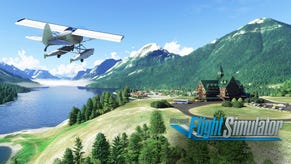Microsoft Flight Simulator review: a remarkable release fit for seasoned pilots and beginners alike
The 2020 revival of Microsoft Flight Simulator isn't just for the hardcore aviation nerds.
Sure, all the features that have made this simulator series a go-to training aid for real life pilots for the last almost-forty years are present and enhanced in this 2020 rebirth. But perhaps the best thing about this game is that it has been designed to be experienced and enjoyed by everybody - not just certified pilots in training.
There are more remarkable things about Microsoft Flight Simulator 2020, of course. Its use of technology is unparalleled: its intricate, laser-scanned cockpits, its incredible cloud, wind and weather simulation, and its AI-enhanced world - that is to say the real world, petabytes of data processed and sifted to deliver an astonishingly close approximation of the real thing.
For me, however, the training aids are what make this a paletable video game and not just a simulator. Much of the development team learned to fly over the course of the game's development and endeavored to create assists that mirrored the way in which you learn to fly in real life. At first, your teacher will only give you control of the most basic functions - so the AI does that for you. Then they'll double and triple confirm the checklist of things you need to do to safely fly; the game handles that too.
The game is obsessed with authenticity, but also embraces accessibility. If you want to taxi from the runway and go through the full pre-flight rigmarole, you can. You can also spawn right on the runway or even in the air, mid-flight. It's incredibly smartly crafted to make sure you can always easily access the parts of flying most of the most interest.
Over time you strip away the assistance. Seasoned pilots can remove it all right away, if they wish. In ways it reminds me of the deeply granular difficulty settings that have become common in simulation racing games like Microsoft's own Forza Motorsport: it's not just easy, medium or hard, but a whole range of assists and settings that combine to make things more realistic and therefore more difficult. Flick everything off and you have staggering, terrifying full authenticity and realism.
The control choices mirror the in-game options and assists, too. You can use a keyboard and mouse, of course, but the basic flight controls are just as accessible with an Xbox controller - vital for a later console release. Both are great, but I ended up going deeper, primarily playing with a Thrustmaster TPR Rudder, Honeycomb Alpha Yoke & Switch Panel and a Logitech Pro Flight Throttle. If you want to keep things simple but go beyond a controller, something like the Thrustmaster TCA Sidestick is also instantly compatible while having a reduced footprint and more affordable price.
Ultimately, you could use any combination of these - just a yoke with a keyboard for everything else, a controller and real-life instruments, or whatever other weird combination makes you comfortable. There's a wide range of accessories available thanks to strong compatibility with years of pro flight sim gear.
All this is to say that I can now confidently pilot several of the aircraft featured in Microsoft Flight Simulator. I wouldn't have the stones to do it in real life, obviously, but if you were to sit me down in that cockpit I could probably correctly talk you through much of the basic functionality. This is impressive going for just a couple of weeks with the game. So it's a most competent learning aid - though as someone who came to this with little interest in learning to fly, I kept playing just because I was loving doing so.
That's the other trick up Flight Simulator's sleeve this time around, you see - it's not just accessible, but it's just incredibly good fun. There is a school of thought around video games that might suggest that this game is less worthwhile because the planes don't have guns on them - and I get it - but there's a lot to experience and enjoy here.
This game releasing in the midst of pandemic lockdown with vastly reduced travel options is actually perfect, in a twisted way. It underlines the power of this game as digital tourism - you can sit back and relax, cruising at lower altitudes over places that interest you, taking in architecture and geography. The sprawl of mankind is visible in minute detail beneath you - and in this Flight Simulator feels like at last a delivery on the promises of the 'power of the cloud' touted at the start of this console generation.
Flight Simulator 2020's world - the whole world, as previously mentioned - is built from Microsoft's Bing Maps data and occasional photogrametric scans taken within cities. Fed into an Azure cloud server, the vast amount of data is crunched in order to create a 3D representation. That means to a relatively solid degree of accuracy you will be able to locate your house, school, workplace or local pub. If you live in a big city, chances are some of the landmarks will have been directly translated - and if you're lucky, you might have enhanced, hand-created 3D models of particularly significant locations dropped into the AI-crafted world.
Much has been written about this technology, including in our recent preview, but all you need to know is that it is an incredible achievement. The detail level up close is of course lower - this is primarily designed to be seen from thousands of feet in the air - but at times, circling airports and cities I knew coming in for landing led to an incredibly uncanny feeling. It feels so real that it gets unreal. You can easily lose yourself in the moment.
Other touches enhance that realism, like drawing in real-world data about other flights and weather conditions. Alternatively you can take direct control of this, even in mid-air. If you want to pause a flight on a sunny, glorious day and put yourself in the eye of a storm instead, you can - just open a menu, adjust a few sliders and you're there - no mess, no loading screens. Then, when the storm terrifies you and nearly sends you down, you can flick back to sunny skies just as easily.
The weather is gorgeous, by the way. Flight Simulator captures one of the greatest joys of flying perfectly - the fact that you can glance out of the window at almost any moment and just take in the beauty of the world. This level of detail wasn't required to satisfy the simulator roots - the most important accuracy is really that of the cockpits - but through this detail and beauty the entire experience is elevated.
Your enjoyment with flight simulator will rest quite heavily on your ability to make your own fun in this sort of way. If you want to take a light plane up to high altitudes and practice stomach-churning tricks, you can. Equally, you can make use of the autopilot and enjoy the thrum of piloting a long-haul flight - which is a strangely relaxing thing that seems to me like it'd be a pretty good hangover cure.
What I'm saying is that there isn't much 'game' here in the traditional sense. Instead it's a proper, old-fashioned sandbox that gives you a bunch of systems and implores you to explore, experiment, learn and have fun. The tutorials are at least strong - but once they're over, you're largely on your own. This is where exploration takes over, both of its AI-crafted world and the intricately detailed hand-made aircraft.
You could level a complaint about the level of content, or how Microsoft is slicing up the game into different versions, locking certain vehicles behind certain prices. But in many ways that's sort of the point of this whole thing - like much of the Xbox offering going forward, it's a service. Unlike most releases where this is new or experimental, this has always been the way with flight sim. This initial release will be expanded out with new content from both Microsoft and third parties including updates to the world detail, new aircraft and of course any necessary updates to reflect the ever-changing real world.
Developer Asobo Studio says Microsoft Flight Simulator 2020 is a ten-year project with many additions to come. That makes sense, as it's a brilliant base package with so very much to love that I can still see myself returning to for years. For me, the casual, it's a perfect low-stakes, relaxing gaming experience. It's a technical achievement and an excellent training aid, but it's also a brilliant piece of escapism, transcending its purpose as a tool to become something far more widely enjoyable - and I can't recommend it enough.





.jpg?width=291&height=164&fit=crop&quality=80&format=jpg&auto=webp)

.jpg?width=291&height=164&fit=crop&quality=80&format=jpg&auto=webp)

.jpg?width=291&height=164&fit=crop&quality=80&format=jpg&auto=webp)


.jpg?width=291&height=164&fit=crop&quality=80&format=jpg&auto=webp)







